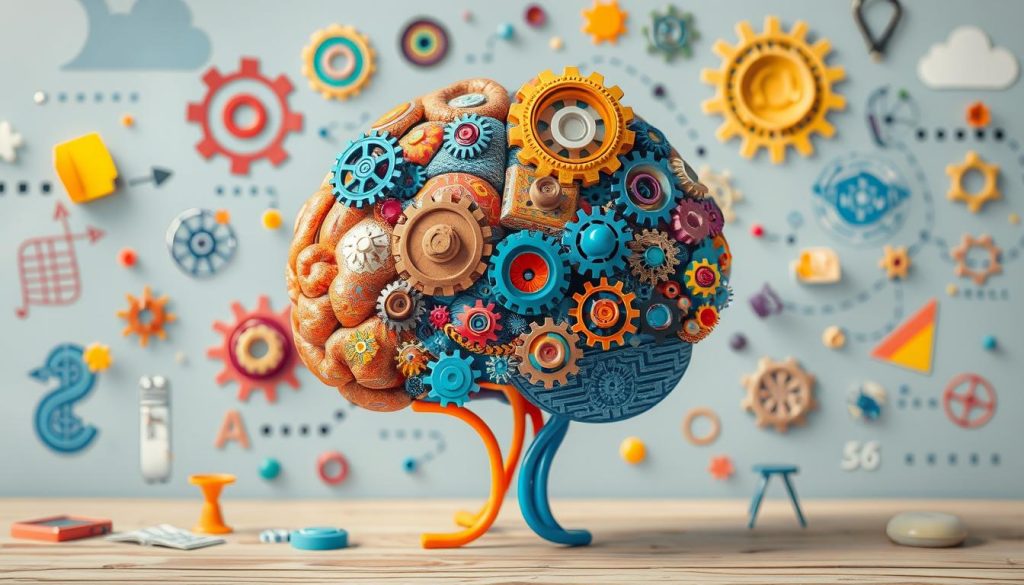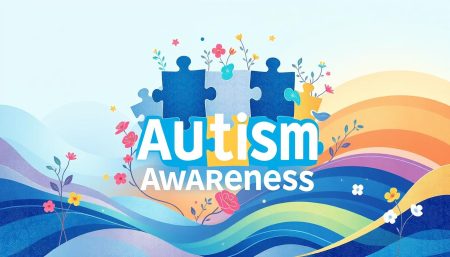The world of neurodevelopmental conditions can be complex. Many people wonder about the relationship between Asperger’s syndrome and autism spectrum disorder. These terms have evolved over time, leaving some confusion in their wake.
In recent years, the medical community has updated its understanding of these conditions. Asperger’s syndrome is now considered part of the broader autism spectrum. This change reflects new research and a more nuanced view of neurodevelopmental differences.
Let’s explore how Asperger’s fits into the current understanding of autism. We’ll look at the traits they share and what makes each unique. This journey will help clarify the connection between these two important terms in the field of neurodevelopment.
The Historical Evolution of Asperger’s Syndrome Classification
The story of Asperger’s syndrome’s journey from a unique diagnosis to part of the autism spectrum is captivating. This change has greatly influenced how we see autism and pervasive developmental disorders.
Hans Asperger’s Original Research and Findings
In the 1940s, Austrian pediatrician Hans Asperger noticed children with special social and communication skills. He saw their deep interests and social challenges. These findings were the start of what we now call Asperger’s syndrome.
Evolution of Diagnostic Criteria Over Time
As research grew, Asperger’s syndrome became more recognized as a unique condition. It was first listed in the DSM-IV in 1994. This classification of Asperger’s syndrome helped many understand their experiences and get support.
Integration into the DSM-5
In 2013, the DSM-5 made a big change. It combined Asperger’s syndrome with autism spectrum disorder. This change aimed to show that autism is a continuous spectrum, not separate conditions.
| Classification | DSM-IV (1994) | DSM-5 (2013) |
|---|---|---|
| Asperger’s Syndrome | Separate diagnosis | Part of Autism Spectrum |
| Autism | Distinct categories | Spectrum disorder |
| Focus | Specific diagnoses | Support needs |
This change in classification has led to debates and changed how we view autism and pervasive developmental disorders. It highlights the need to see autism as a spectrum with varied presentations and support needs.
Is Aspergers Autism? Exploring the Diagnostic Shift

The question “is aspergers autism” has sparked much debate in recent years. In 2013, a significant change occurred in the world of developmental disorders. The American Psychiatric Association released the fifth edition of the Diagnostic and Statistical Manual of Mental Disorders (DSM-5). This update brought a major shift in how we classify and diagnose autism spectrum disorder.
Before this change, Asperger’s syndrome was considered a separate condition from autism. It was often referred to as “high-functioning autism.” People with Asperger’s typically had strong language skills but struggled with social interaction and had specific interests. The DSM-5 eliminated Asperger’s as a distinct diagnosis. Instead, it placed all forms of autism under one umbrella term: autism spectrum disorder.
This shift aimed to improve diagnosis and treatment. By viewing autism as a spectrum, doctors can better tailor support to each person’s needs. Some individuals previously diagnosed with Asperger’s may now receive an autism spectrum disorder diagnosis. Others might fall under the category of Social Communication Disorder, a new diagnosis introduced in the DSM-5.
For many, this change raised concerns about identity and access to services. Some worry that without the Asperger’s label, they might lose support or face stigma. Others welcome the shift, seeing it as a step towards better understanding and acceptance of neurodiversity. As research continues, our understanding of autism spectrum disorder evolves, shaping how we approach diagnosis and support.
Understanding the Autism Spectrum Disorder Framework
Autism spectrum disorder is a complex condition that affects how people interact and communicate. It shows up differently in each person. This means some may need a lot of support, while others can be more independent.
The Spectrum Concept Explained
The autism spectrum shows a range of characteristics and abilities. Some people need a lot of help, while others can manage on their own. This shows why each person needs a unique approach in autism spectrum disorder care and support.
Different Levels of Support Needs
Autism support needs are divided into three levels:
- Level 1: Requiring support
- Level 2: Requiring substantial support
- Level 3: Requiring very substantial support
These levels guide treatment plans and help with social communication challenges.
Diagnostic Criteria Under Current Guidelines
Professionals use specific criteria to diagnose autism spectrum disorder. These include:
| Core Areas | Specific Criteria |
|---|---|
| Social Communication | Challenges in social-emotional reciprocity, nonverbal communication, and developing relationships |
| Restricted Interests | Repetitive behaviors, inflexible routines, fixated interests, and sensory sensitivities |
| Early Onset | Symptoms present in early developmental period |
| Functional Impact | Significant impact on social, occupational, or other important areas of functioning |
Knowing these criteria helps in early identification and support for those with this condition.
Key Characteristics of Former Asperger’s Diagnosis
Asperger’s syndrome was once seen as different from autism. But, it shares many traits with autism. People with Asperger’s often have unique qualities that make them stand out in the autism spectrum.

Those with Asperger’s usually have average to above-average intelligence. This is a key feature of high-functioning autism. They often show great knowledge and passion for certain subjects.
Social interactions can be tough for those with Asperger’s. They might find it hard to understand non-verbal signals or keep up in conversations. Even so, they often want to connect with others but don’t always get social cues right.
Language skills in Asperger’s syndrome usually grow normally. But, they might speak in a formal or pedantic way. This is sometimes called “little professor” syndrome.
| Characteristic | Description |
|---|---|
| Cognitive Abilities | Average to high IQ, strong memory, focused interests |
| Social Skills | Difficulty with non-verbal cues, struggle with empathy |
| Communication | Advanced vocabulary, literal interpretation of language |
| Sensory Sensitivities | Heightened sensitivity to sounds, textures, or lights |
| Motor Skills | Possible clumsiness or poor coordination |
Even though Asperger’s is no longer a separate diagnosis, these traits help identify people on the autism spectrum. They may need special support strategies.
Social Communication Patterns in Autism and Asperger’s
People with autism and those with Asperger’s syndrome face special social communication challenges. These issues affect their daily lives and how they connect with others.
Verbal Communication Differences
Those on the autism spectrum often find it hard to express themselves. They might speak in a flat tone or struggle with sarcasm and metaphors. Some might know a lot of words but find it tough to keep a conversation going.
Non-verbal Communication Challenges
Non-verbal signals are a big problem for people with autism. They might avoid eye contact, miss facial cues, or have trouble with gestures. These issues can cause misunderstandings in social situations.
Social Interaction Patterns
Social interactions can be tough for those with Asperger’s or autism. They might:
- Have trouble starting or keeping friendships
- Prefer being alone over being with a group
- Struggle with unwritten social rules
- Find small talk boring or hard to follow
Knowing these patterns helps make places more welcoming. It also leads to better support for those on the autism spectrum.
Cognitive Abilities and Learning Styles
People with high-functioning autism or Asperger’s syndrome have special ways of thinking and learning. This condition changes how they handle information and see the world around them.

Those with Asperger’s often shine in certain areas. They’re great at spotting patterns, paying close attention to details, and solving problems logically. These skills can lead to big successes in math, science, and tech.
Learning styles differ among those with this condition. Some learn best by seeing things, while others prefer to do hands-on activities. Many also like following routines and being in structured places. This affects how they learn and solve problems.
- Strong memory for facts and figures
- Ability to focus intensely on subjects of interest
- Tendency to think outside the box
- Challenges with abstract concepts
Knowing these special traits helps teachers and employers create better environments. By understanding the strengths and challenges of Asperger’s, we can help people on the autism spectrum grow and succeed.
Sensory Processing and Environmental Responses
Sensory processing differences are a big part of autism. People with autism see the world in their own way. They might feel things too strongly or not enough.
Common Sensory Sensitivities
Many on the autism spectrum face sensory challenges. These can include:
- Sensitivity to loud noises or specific sounds
- Discomfort with certain lighting conditions
- Aversion to particular textures in food or clothing
- Difficulty processing multiple sensory inputs simultaneously
Coping Mechanisms and Adaptations
People with autism find ways to deal with too much sensory input. Some common strategies include:
| Coping Strategy | Description |
|---|---|
| Noise-canceling headphones | Reduce auditory input in noisy environments |
| Weighted blankets | Provide deep pressure for calming effects |
| Fidget toys | Offer tactile stimulation to aid focus |
| Sensory breaks | Allow time to recharge in a calm space |
These strategies help people with autism feel more comfortable. It’s key to understand and meet their sensory needs. Remember, everyone’s sensory experiences are different, and some might have strong interests in certain sensory inputs.
Special Interests and Focused Behaviors
People with Asperger’s syndrome often have intense interests and repeat certain behaviors. These interests can be all-consuming, making them stand out from usual hobbies. They might spend hours learning about a specific topic, collecting items, or doing certain activities.

Restricted interests in Asperger’s can show up in many ways. Some might remember lots of info on a special topic. Others might create detailed systems or patterns. These interests can be comforting and stable for those on the autism spectrum.
Repetitive behaviors are also common in Asperger’s. These can be physical, like hand-flapping or rocking, or mental, like counting or organizing things in a certain order. These behaviors might seem odd to others. But for those with Asperger’s, they bring a sense of predictability and control.
| Common Special Interests | Typical Repetitive Behaviors |
|---|---|
| Trains and transportation | Hand-flapping |
| Astronomy and space | Rocking back and forth |
| Historical events | Organizing objects |
| Specific animal species | Repeating words or phrases |
It’s important to understand these special interests and behaviors for those with Asperger’s. By recognizing and respecting these traits, we can make more inclusive spaces. This helps us build strong connections with those on the autism spectrum.
Executive Functioning and Daily Life Management
People with high-functioning autism face special challenges in managing their daily lives. They often find it hard to organize, plan, and keep track of time. It’s important to understand these issues to help them better.
Organization and Planning Challenges
Those on the autism spectrum may find it tough to organize tasks and plan their day. This makes it hard to decide what to do first or how to tackle big projects. Some common problems include:
- Difficulty sorting and categorizing information
- Trouble initiating tasks or switching between activities
- Challenges in creating and following schedules
- Overwhelm when faced with multiple options or decisions
Time Management Considerations
Managing time is a big challenge for those with high-functioning autism. They might have trouble guessing how long things will take or lose track of time when they’re really into something. Some specific time-related issues include:
| Time Management Challenge | Impact on Daily Life |
|---|---|
| Difficulty gauging task duration | Frequently running late or missing deadlines |
| Hyperfocus on preferred activities | Neglecting other important tasks or responsibilities |
| Trouble with time concepts | Struggling to plan for future events or understand schedules |
| Inability to multitask effectively | Feeling overwhelmed when juggling multiple responsibilities |
By understanding these challenges, people with autism and their supporters can work on strategies. This helps improve daily life management skills and boosts overall quality of life.
The Impact of Language Development

Language is key in autism spectrum disorder and what was once called Asperger’s syndrome. People on the spectrum face unique challenges in talking and understanding others. These issues can affect how they connect and share their thoughts.
In classic autism, kids often have trouble speaking. Some might not talk at all, while others have a small vocabulary. Those with Asperger’s syndrome, on the other hand, usually speak like others their age. They might even know a lot about things they love.
But, both groups struggle with using language in everyday talks. They find it hard to get the context, tone, and small details in conversations. Let’s look at some important language traits:
- Literal interpretation of words and phrases
- Difficulty with sarcasm and figurative language
- Challenges in maintaining back-and-forth conversations
- Tendency to monologue about special interests
Knowing these language patterns helps in finding ways to communicate better. It’s vital to remember that each person on the autism spectrum is different. They have their own language strengths and challenges.
| Aspect | Classic Autism | Former Asperger’s Syndrome |
|---|---|---|
| Early Language Development | Often delayed | Typically on time |
| Vocabulary | May be limited | Often extensive in areas of interest |
| Pragmatic Language Use | Significant challenges | Challenges present but may be subtle |
| Nonverbal Communication | Often impaired | Usually impaired to some degree |
Motor Skills and Physical Coordination
Motor skills and physical coordination are key in daily life for those with autism spectrum disorder (ASD). This includes those who were once diagnosed with Asperger’s syndrome. ASD often affects both fine and gross motor skills, impacting physical functioning in many ways.
Fine Motor Skills Development
Fine motor skills involve small, precise hand and finger movements. People with autism may struggle with these skills, affecting tasks like writing, dressing, or using utensils. Some may do well in certain tasks but struggle with others, showing the varied nature of ASD.
Gross Motor Skills Challenges
Gross motor skills involve larger body movements, like running, jumping, or catching. Many on the autism spectrum, including those with Asperger’s syndrome, face challenges with coordination, balance, and spatial awareness. These issues can make it hard to join in sports, physical education, and everyday activities.
| Motor Skill Area | Common Challenges | Potential Interventions |
|---|---|---|
| Fine Motor | Handwriting, using scissors, tying shoelaces | Occupational therapy, adaptive tools, practice exercises |
| Gross Motor | Balance, coordination, team sports | Physical therapy, individualized sports programs, sensory integration activities |
It’s important to understand these motor skill challenges to develop effective support strategies for ASD. By focusing on both fine and gross motor skills, we can enhance physical functioning and improve quality of life for those with ASD.
Emotional Recognition and Expression
People on the autism spectrum, including those with Asperger’s, face special challenges with emotions. They struggle with recognizing and showing feelings. This is a big part of autism spectrum disorder, affecting how they connect with others.
For those with high-functioning autism, reading faces and voices can be tough. They might miss out on emotional clues that others easily catch. This can cause misunderstandings and make it hard to make friends.
Showing feelings can also be a problem. Some might feel deeply but have trouble showing it. Others might express emotions in ways that seem different to most people. This can make it hard for others to understand and connect with them.
But, many with autism find ways to deal with emotions. They might get help through social skills training or practice. It’s important to understand these differences to help everyone feel included.
FAQ
Q: Is Asperger’s syndrome now considered a separate diagnosis from autism?
A: No, Asperger’s syndrome is no longer seen as a separate diagnosis. In 2013, the DSM-5 changed this. It now includes Asperger’s under the autism spectrum disorder category. This change shows that autism is a spectrum with different needs.
Q: What were the main traits of what was once called Asperger’s syndrome?
A: Traits of what was once called Asperger’s include social communication issues and restricted interests. People with it often have repetitive behaviors and average to above-average intelligence. They usually don’t have language delays early on. These traits are now seen as part of autism.
Q: How does high-functioning autism differ from what was previously called Asperger’s syndrome?
A: High-functioning autism and Asperger’s are very similar. The main difference was early language delays in Asperger’s. But now, both are part of autism spectrum disorder. This change recognizes their shared traits and the spectrum nature of autism.
Q: Can adults be diagnosed with autism if they were previously diagnosed with Asperger’s syndrome?
A: Yes, adults with a past Asperger’s diagnosis can now be diagnosed with autism spectrum disorder. Many use the term autism spectrum disorder today. Yet, some may stick with their original Asperger’s diagnosis.
Q: What are some common sensory sensitivities in individuals on the autism spectrum?
A: People on the autism spectrum often have heightened sensitivity to sounds, lights, and smells. They might also be less sensitive to some inputs. These sensitivities can affect daily life and social interactions.
Q: How do special interests manifest in individuals on the autism spectrum?
A: Special interests in autism spectrum individuals are intense and focused. They might be very passionate about specific topics or activities. These interests can bring joy, comfort, and expertise, and shape their social and career paths.
Q: What challenges might individuals on the autism spectrum face with executive functioning?
A: Those on the autism spectrum may struggle with executive functioning. This includes issues with organization, planning, and starting tasks. These challenges can affect daily life and work, but support can help manage them.
Q: How does language development differ in individuals previously diagnosed with Asperger’s syndrome compared to classic autism?
A: Those with a past Asperger’s diagnosis usually didn’t have early language delays. They often have strong vocabulary and grammar but may struggle with social language. Language abilities vary widely in autism, though.


















